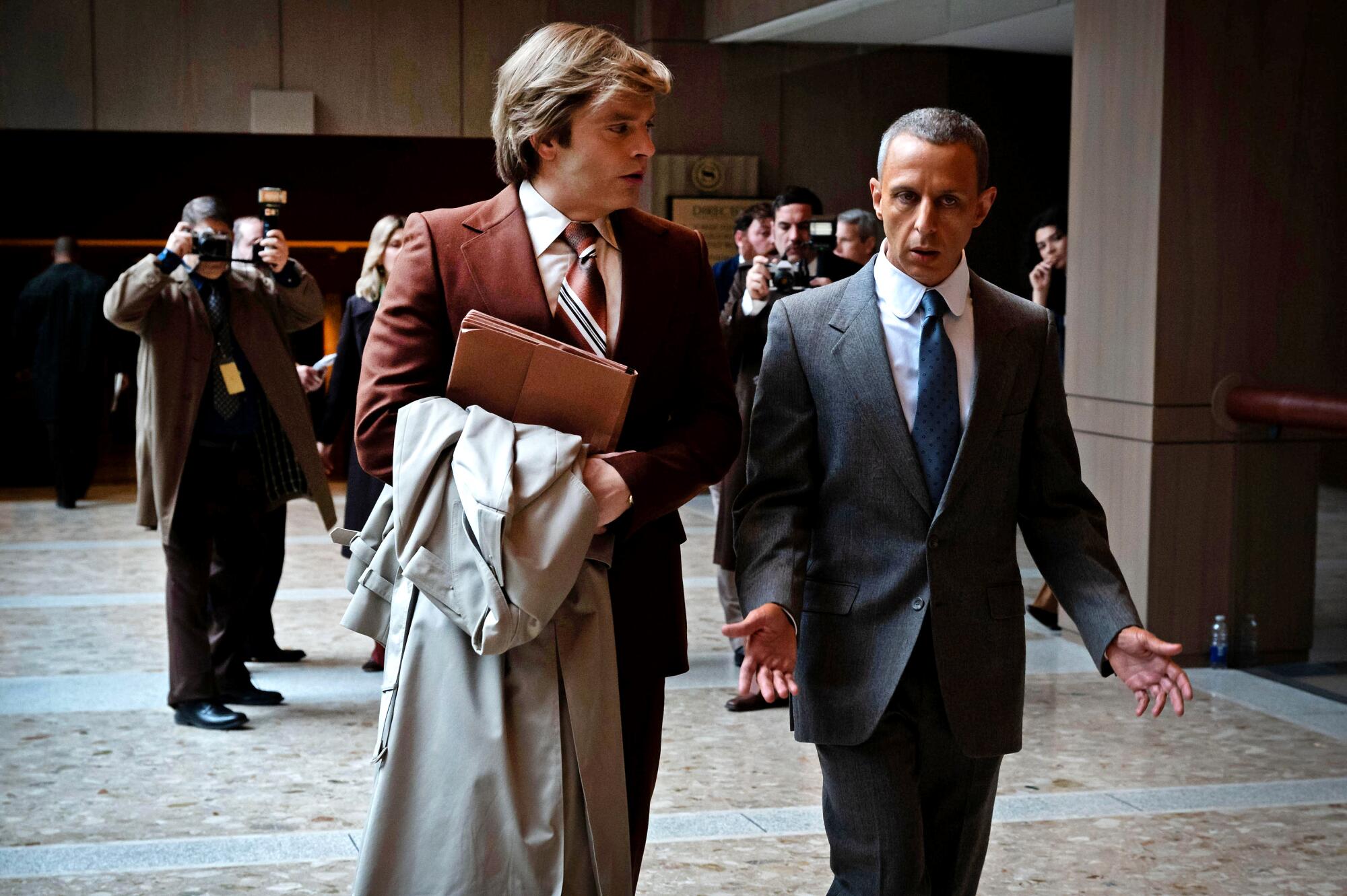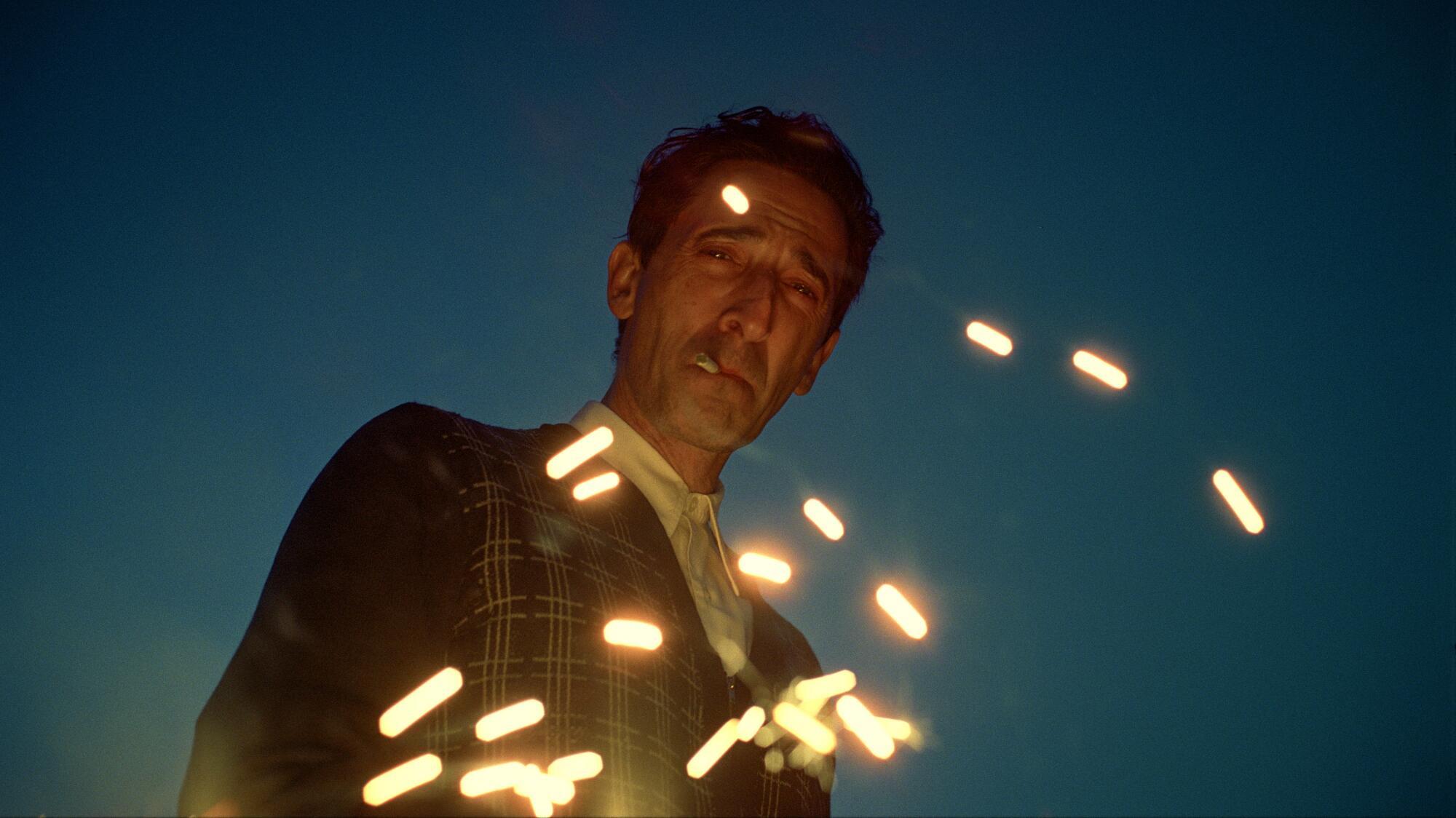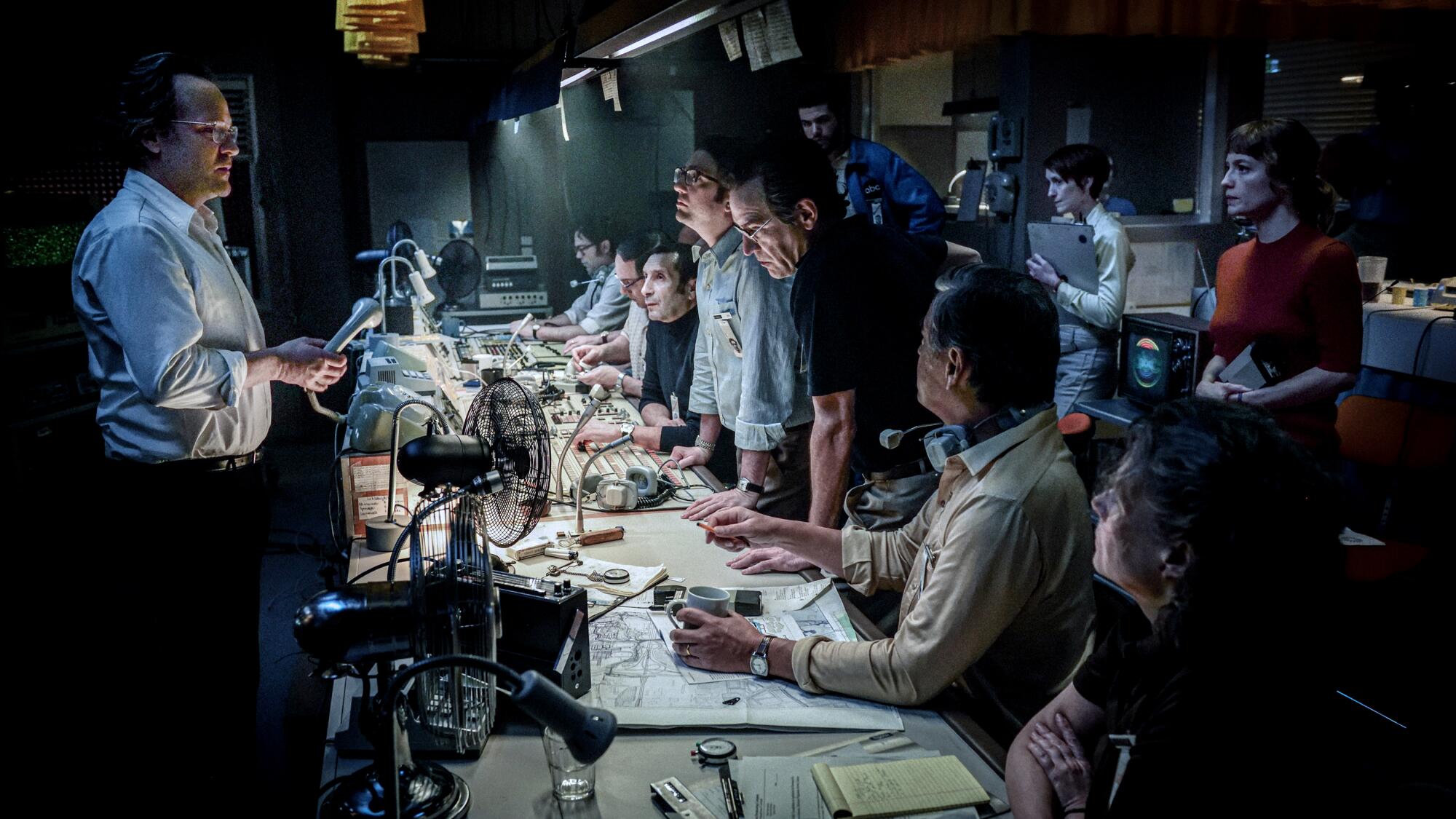As soon as an actor finds his title popping up in Oscar conversations, he’s just about arrived within the business, proper? Really, no, not essentially, says Jeremy Sturdy, who performs unscrupulous lawyer and Donald Trump mentor Roy Cohn to a lot acclaim in “The Apprentice.”
“There’s a thing called ‘arrival fallacy,’ which is that the horizon is just always receding. You don’t arrive. I mean, I’ve never felt like I’ve arrived. It’s just a search, and you’re on the frontier of uncertainty and doubt, and taking risks.”
“And then the bottom falls out, and you keep looking,” provides Adrien Brody, who performs the Holocaust survivor and visionary architect on the coronary heart of Brady Corbet’s “The Brutalist.”
“That frontier just keeps moving,” Sturdy agrees.
Even now, with this season’s breakout performances and glowing evaluations, a dialog amongst a number of actors reveals they share the identical fears and doubts as the remainder of us.
Watch the complete dialog
“I don’t think I ever looked at the next job and went, ‘All right, it’s coming and here we go.’ I think it’s always just the terror of, ‘OK, I got the job. Am I going to ruin it?’ The fear of, ‘I’m wrong for it,’” says Kieran Culkin, who stars within the affecting “A Real Pain” with the movie’s writer-director, Jesse Eisenberg.
Actors Colman Domingo, from left, Peter Sarsgaard, Adrien Brody, seated, Kieran Culkin, Sebastian Stan, Jeremy Sturdy.
These excerpts from that dialog have been edited for size and readability.
It’s a journey. It’s a course of. So how do you strategy auditions?
Sebastian Stan: One of the best recommendation I ever acquired was from Israel Hicks, who was the theater head at Rutgers, the place I went to highschool. And he all the time mentioned, “You’ve got to just bring the day with you to the audition.” No matter’s taking place as much as strolling in that door simply … like possibly you spilled espresso on you, otherwise you acquired a foul telephone name, or no matter. You simply deliver within the reality of that day.
Peter Sarsgaard: However for me, daily that I had an audition that I cared about was a day of excessive nervousness. And so I solely did properly within the auditions the place it was extraordinarily excessive stakes. I couldn’t deny what I used to be feeling. I might’ve appeared like a psychopath. I needed to let it out. And so the roles … I bear in mind doing auditions generally the place I might be bizarrely emotional in a scene that was not emotional. As a result of I f— wished it.
Jeremy Sturdy: I had a supervisor as soon as who instructed me, “You know, you seem desperate. That’s why you’re not getting it: You seem desperate.” And I mentioned, “I am desperate.” That is like we’re preventing for our lives attempting to do that factor.
Sarsgaard: It looks like that generally.
Sturdy: … and you actually need to work. It does really feel miraculous once you get the prospect to work.


Jeremy Sturdy performs Roy Cohn, mentor to Donald Trump, in “The Apprentice.”
Adrien Brody: I booked a film once I was 14, which was one of many first issues I went out for. And my dad took me to the audition, and he instructed me, “Go in there like you already have it. You’re just showing them how you’re going to do it. Don’t go in there asking for the job.”
Kieran Culkin: I believe I used to be instructed in my first audition virtually the other, which was like —
Brody: Go and beg them.
Culkin: — It was like, “You’re going into something that’s not yours so you don’t have to feel, so [acts stressed].” You mentioned your first audition was one thing you booked?
Brody: After which it was 17 years of not getting work.
I knew I needed to invite in tenderness and a grace that he maintained whereas he was on the within.
— Colman Domingo
From auditions to present performances, Colman, you play John “Divine G” Whitfield, a person who was wrongfully incarcerated in “Sing Sing,” and the true man can also be govt producer. What’s that have like, attempting to showcase his journey whereas he’s there and part of this movie?
Colman Domingo: You need to honor the spirit of the individual but additionally liberate your self from a portrayal of them. I really feel like even once I met him, I downloaded info. I didn’t ask him something, as a result of I’m not that one that desires to pry into somebody’s life or say, “How was it for you in the inside?,” all that stuff. We simply acquired to know one another like we get to know anybody, you realize what I imply? Probably the most banal, easy issues.

Colman Domingo performs an inmate concerned in a theater program in “Sing Sing.”
(Dominic Leon/A24)
And there have been two issues about him: once I came upon that he thought of himself type of a jailhouse lawyer and the way he was all the time within the regulation library, and he was advocating for others for good meals, for his personal liberation finally, but additionally even — when he based this theater firm there — Rehabilitation By way of the Arts. And all these inmates had been discovering that factor that was so sorely wanted on this harmful place: a spot to unpack, to be tender, to place your self in another person’s footwear. Grown males going to locations that they might have by no means been allowed to expertise or be, particularly Black and brown males particularly. I knew I needed to invite in tenderness and a grace that he maintained whereas he was on the within.

“I can see how past suffering informs insight and informs a kind of creative fervor and the need to leave something indelible behind,” Adrien Brody says of “The Brutalist” and his circle of relatives historical past.
Kieran, you had been working with Jesse Eisenberg, who’s additionally the screenwriter and director. Which model was simpler to work with, Jesse the actor or Jesse the director?
Culkin: He was nice in any respect of these issues. I imply, going into it, he wrote a wonderful script. And I knew him to be an excellent actor. I didn’t know what he was going to be like as a director. However that was the primary time I’ve labored with an actor that additionally directed. Have you ever guys achieved that but? It’s powerful. That’s like, Day 1, him doing a scene with you as your companion, after which they go, “Cut,” after which go, “Here’s how you can do it better.” And I’m sitting right here going like, “Oh, you’re going to judge me? Because I got f— notes for you too. I know how you can do it better too.” After which the defenses go up and all that. However he was implausible. And it was solely his second movie [as writer-director].

“I felt like I understood him right away and understood this dynamic right away,” Kieran Culkin says of his “A Real Pain” character’s relationship to his cousin, performed by Jesse Eisenberg.
(Searchlight Photos)
I believe we are able to all relate to your character, Benji. It’s virtually a type of, “I love him because he’s crazy. But he also drives me crazy because he’s crazy.” What a part of that resonated with you?
Culkin: Once I learn it, I discovered the man to be actually shocking and actually simply … I felt like I understood him immediately and understood this dynamic immediately. However then 20 pages in, he would say one thing fully shocking. And I went, “Oh, this guy, almost in spite of you, if you asked him a question, he’s going to give you something you’re not going to expect.”
And I liked it. So I simply went, “I’m not going to prepare at all.” I didn’t learn it once more for a 12 months. After which proper earlier than we did it, I learn it as soon as. I might not need to know what the scene we had been doing was till I used to be strolling to set that day, which might give Jesse a variety of nervousness. I’d be like, “What are we shooting today?” And he’s like, “You’re kidding. You have a whole speech.”
Brody: You need to work with Ken Loach. I did a film with him, and he would give us half the scene. And so that you wouldn’t know what the top of that scene was as a result of he was working with predominantly nonactors. After which so whoever the catalyst was within the scene acquired that part. And this individual would fall down, and also you didn’t know if that individual simply —
Culkin: Tripped or that was the scene? I need to try this. I need to work with that individual.
Sarsgaard: I auditioned for him, and it was like, “All right, let’s just improvise.” And I’m like, “Well, give me a … Where do I begin?” “Just do something.” And I discovered it extremely troublesome. For me, the rationale I do it’s the story. So I don’t must know what I’m going to do within the scene, however I’m driving the story?

“It’s like game day. They’re just in it. They just went 22 straight hours of just doing it,” Peter Sarsgaard says of the group overlaying the terrorist assault on the Munich Olympics, the story of his movie, “September 5.”
Sturdy: Peter and I needed to do a factor yesterday known as Fearless Performances. And we didn’t have time to say it, however I awakened this morning pondering it’s such a misnomer as a result of there’s a lot worry concerned, no less than for me. [To Culkin] I used to be fascinated with a dialog we had once you had been fascinated with doing Jesse’s film. You had been on the precipice of it. It felt like an enormous threat and one thing you hadn’t achieved. And what I really like about what all of us get to do is try and do one thing that you just don’t know that you are able to do. I’m working in type of Bruce Springsteen world proper now, and he mentioned one thing in his autobiography, that “the experience that you have, the exhilaration of it and the depth of it is directly proportional to the void that you’re dancing over.” And so I discover that that equation works.
Stan: I believe all of it’s worry now. For me, actually, if I’m pondering I can’t do it, [it] is possibly the largest signal that I needs to be attempting to do one thing. It’s really easy to fall into these little methods, what’s labored earlier than, and also you simply do it once more. So, particularly with these final two for me, it was so paralyzing at instances that I used to be virtually pushed by it.
I believe all of it’s worry now. For me, actually, if I’m pondering I can’t do it, [it] is possibly the largest signal that I needs to be attempting to do one thing.
— Sebastian Stan
Taking part in Donald Trump, was that worry? He’s been the president, he’s going to be the president once more. What had been the challenges or your mind-set going into that?
Stan: Properly, I imply, that is such a collaboration. It’s the director, it’s who’re your companions. It’s this entire factor about belief and with the ability to go there with any individual. However then, there’s one thing about once you become old and also you need to really feel such as you’re a part of a significant work. You’re including to a dialog, reflecting these instances that we’re in regardless of how uncomfortable they’re.

“The movie is sort of about this relationship in a sense, a love story,” Jeremy Sturdy says of Roy Cohn and Donald Trump in “The Apprentice.”
(Pief Weyman/Apprentice Productions)
Sturdy: The film is type of about this relationship in a way, a love story. This type of darkish chrysalis that created the Donald Trump that we all know at present. What joined them collectively, I believe, had been sort of darkish affinities. They had been each these outsiders from the boroughs with great life power and ambition with a shared, I believe, lack of scruple or moral core, for whom profitable was the one ethical measure.
It’s been unusual to speak about this film as a film proper now, as a result of it’s a couple of very residing hazard, and I have a look at what’s taking place on this nation proper now, and I believe you may hint a lot of it again to the affect of Roy Cohn and his ideology, and his nihilism, and his type of gospel of hatred and divisiveness. That’s the political facet. The artistic facet was actually fulfilling. Roles like this are sort of a holy grail for an actor, the place there’s a level of problem, and also you need to attempt to rework, and also you need it additionally to be alive and never simply mimetic and all these issues.

“You have to honor the spirit of the person but also liberate yourself from a portrayal of them,” Colman Domingo says of enjoying an actual individual in “Sing Sing.”
A few of these movies, there’s a historic gravity to them. Adrien, with “The Brutalist,” your character involves America after the genocide however then realizes it’s troublesome to succeed right here. The place did you go to channel this character?
Brody: Properly, my mom is a Hungarian immigrant and an artist, a New York photographer. And he or she’s additionally somebody who has sort of guided me in my understanding of artwork and the craving to go away behind one thing that’s significant and brings extra gentle than darkness to this world. She and her mother and father fled war-torn Budapest in 1956 on the again of a truck, below a mattress of corn, as they had been taking pictures flares and attempting to mainly shoot down folks fleeing the Soviet occupation.

Adrien Brody performs a Holocaust survivor who immigrates to America in “The Brutalist.”
(A24)
I witnessed how arduous it was for [my grandfather], as a result of his English-language expertise had been lower than par, it prevented him from getting work. And in order that’s a layer of connection, a sense of realizing the journey and really completely different from [character László Tóth’s] journey, however there are very many parallels. And his journey of fleeing Nazi-occupied Europe and surviving focus camps. I can see how previous struggling informs perception and informs a sort of artistic fervor and the necessity to depart one thing indelible behind.
Sturdy: There’s an intersectionality with these movies as tales with actual issues in our world. I really feel just like the world is on hearth. And there’s a job for storytelling that’s so important in our world proper now. And I don’t assume there’s one other artwork kind that has that connective energy, arguably.
Stan: And the concept that in a system like Sing Sing, there’s a degree of acceptance of self that’s taking place on such a deeper, extra profound degree than it’s truly taking place in the true world. As a result of I really feel like “The Apprentice” and “A Different Man” are a lot about identification and self-truth, and the lack of self, and the denial of actuality, which is a really actual factor that’s taking place now. I don’t know if individuals are within the reality or confronting themselves, or wanting to simply accept themselves. Individuals are extra excited about inventing their very own model of issues.


Kieran Culkin ready little or no for his function in “A Real Pain.”
Peter, speaking concerning the gravity of world occasions: “September 5” does this in such element, what was taking place there in Munich. What it’s like having to cope with one thing of that magnitude?
Sarsgaard: Simply by speaking to the fellows concerned, I imply, they don’t take into consideration the very fact they’re concerned in one thing of that magnitude, as a result of it’s like recreation day. They’re simply in it. They only went 22 straight hours of simply doing it, and doing it, and doing it. They pointed a dwell digital camera at a balcony, and 700 million folks watched that picture. It’s a balcony, however it’s the potential for violence that’s actually conserving them there. For a few of them, their hearts are pounding as a result of they’re hoping for the survival of the folks which are in there. And I believe that’s a superb many individuals. However we’ve to acknowledge this different a part of humanity that’s a sort of schadenfreude the place we’re lusting for some violence.

Peter Sarsgaard, left, performs Roone Arledge heading up the ABC Sports activities group that acquired caught up within the terrorist assault on the 1972 Munich Olympics in “September 5.”
(Jurgen Olczyk/Paramount Photos)
The way in which that at any given second in our lives, proper now, we may choose up our telephone, and probably the most horrendous factor conceivable is happening on the planet, after which we are able to sit and joke with one another, and eat popcorn, and go watch a comedy. I imply, I don’t actually have the reply. I believe one of many pretty issues that my film does is ask a variety of questions on the way in which that we devour media, about, “Does a camera tell the truth anymore?” This concept that these guys had new expertise, which was a dwell digital camera, and the minute the hostage disaster occurred, they pointed it.

“It was a very powerless experience … a terrifying experience. How people pretend you’re totally nonexistent,” Sebastian Stan says of strolling in New York Metropolis carrying the make-up for the disfigured man he performs in “A Different Man.”
Sebastian, in “A Different Man,” there’s a self-reflection in your character, who has a possibility to current himself otherwise. What did you study how we view ourselves versus how others view us? And speak about working with Adam Pearson, who has a few of these identical bodily challenges within the movie.
Stan: Adam Pearson, who’s an excellent actor from “Under the Skin,” and he’s acquired neurofibromatosis, that are these tumors that develop at round 3 or 4 years outdated. And the largest reward I used to be capable of obtain engaged on that film was his mom coming as much as me and saying afterward, “I’ve always wished for someone to walk in his shoes. And you were able to do that.” And I used to be fortunate. We had an excellent prosthetics artist, Mike Marino. And I used to be capable of stroll across the metropolis in that, and nobody acknowledged me. And it was a really powerless expertise … a terrifying expertise. How folks fake you’re completely nonexistent.

Adam Pearson, at left, and Sebastian Stan in “A Different Man.”
(Matt Infante/A24)
Properly, a part of why the film’s particular, and I wished so deeply to be concerned with it, is that it talks about this curiosity that all of us have. However we haven’t discovered concerning the common individual on the market. The common individual has to combat in opposition to these narratives that we’ve grown up with when it comes to not realizing the way to deal with that second. So two issues occur: ignorance or judgment. And the filmmaker, who’s disfigured himself, actually wished to deliver it out within the open. And for us to go on this journey and get extra in contact with how can we strategy that another way. However on a extra relatable foundation, it truly is about mendacity to your self. And as soon as the lie occurs, what you need to hold doing to keep up the lie and suppress the reality.
Brody: And so they’re so arduous to undo.
Stan: And the way far we are able to go to not face that painful second with ourselves. And that’s what the character endures. By the point [he sees it] it’s too late, his life’s been taken away from him.
Thanks for being right here, gents …
Brody: This has been sort of particular. I didn’t know what to anticipate. We’re all sort of actually and thematically speaking about what’s propelling every of us. And aside from you needing f— panic and —
Culkin: I used to be going to say, we’re all a bit bit completely different.
Brody: However I really like that too although. You realize what it’s? You’re tremendous sincere. You might be sincere along with your work.
Culkin: Yeah, thanks.
Brody: Your comedic sensibilities.
Culkin: [To camera] You continue to rolling on this? Let’s get a pleasant sound chew.




